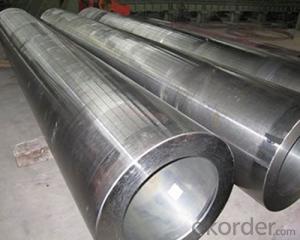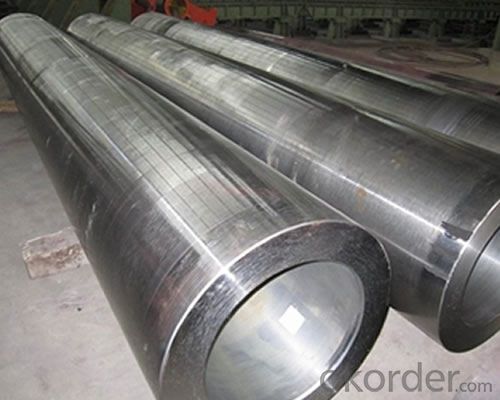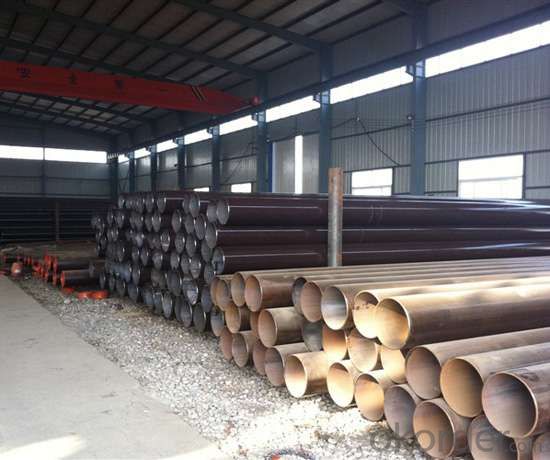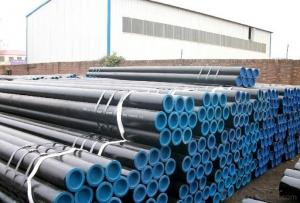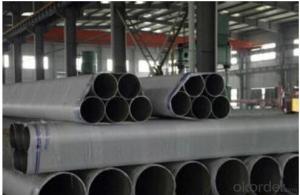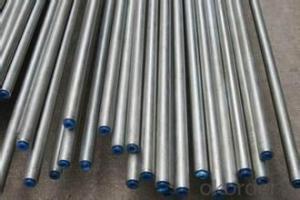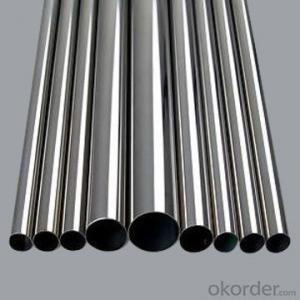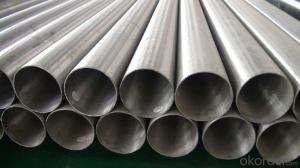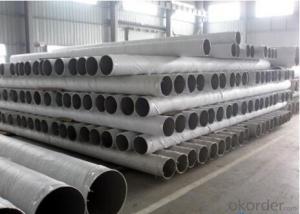Seamless Alloy-Steel Pipe 34CrMo4 ASTM SA213, SA335, A369, A209, A250, G3462, G3467
- Loading Port:
- Shanghai
- Payment Terms:
- TT OR LC
- Min Order Qty:
- 1000 kg
- Supply Capability:
- 10000 kg/month
OKorder Service Pledge
OKorder Financial Service
You Might Also Like
Packaging Detail: | Bundle or Container or as per customers requirement. |
Delivery Detail: | within 25 days after we receive an irrevocable L/Cor 30% deposit |
ASTM A335 Seamless Alloy-Steel Pipe
Standard: BS 1139, BS 3059-2, JIS G3454-2007
Grade: 10#-45#, 15NiCuMoNb5, 10Cr9Mo1VNb
Detailed introduction to ASTM A335 seamless alloy steel pipe:
ASTM A335 seamless alloy steel pipe
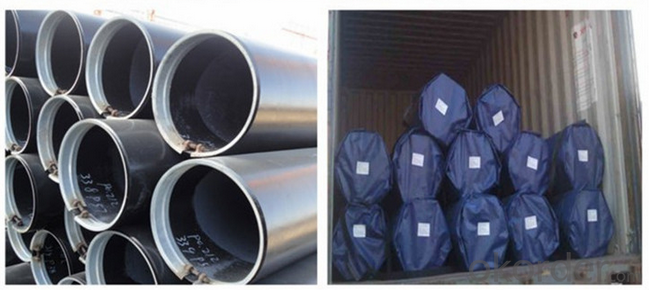
Packaging Detail: | Bundle or Container or as per customers requirement. |
Delivery Detail: | within 25 days after we receive an irrevocable L/Cor 30% deposit |
ASTM A335 Seamless Alloy-Steel Pipe
Standard: BS 1139, BS 3059-2, JIS G3454-2007
Grade: 10#-45#, 15NiCuMoNb5, 10Cr9Mo1VNb
Detailed introduction to ASTM A335 seamless alloy steel pipe:
ASTM A335 seamless alloy steel pipe

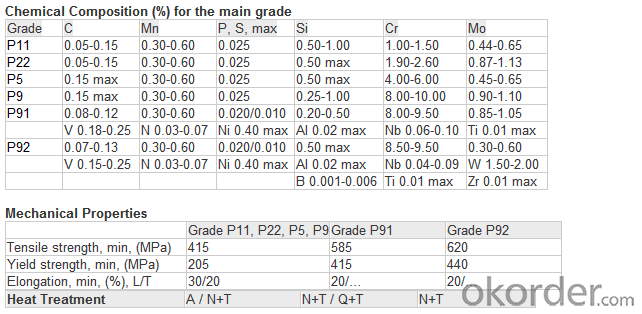
FAQ:
1) why you chose us ?
Professional Manufacturer and supplier of Steel pipe
More than 14 years’ professional producing experience
We can get the lowest ex-factory prices. The price are quite reasonable and it is lower than our commercial peers. also, we can guarantee the qualities of our products.
BV, ISO certificates and SGS test can be provided to assure the quality of our products.
2) Our minimum order quantity:
10 Metric Tons or one 20ft or 40ft Container.
3) How about the Delivery Time?
The steel pipe will be produced since we getting your deposit by T/T or Your original L/C. For normal size, some stocks in our factory now, we can supply once you need.
4)What kind of payment does your company support?
T/T, 100% L/C at sight, Cash, Western Union are all accepted.
5) Do you charge for the samples?
According to our company principle, we just charge for samples, you pay for the freight /courier charge.
6) Main market:
Mid East, South America, Africa, Southeast Asia, India etc
FAQ:
1) why you chose us ?
Professional Manufacturer and supplier of Steel pipe
More than 14 years’ professional producing experience
We can get the lowest ex-factory prices. The price are quite reasonable and it is lower than our commercial peers. also, we can guarantee the qualities of our products.
BV, ISO certificates and SGS test can be provided to assure the quality of our products.
2) Our minimum order quantity:
10 Metric Tons or one 20ft or 40ft Container.
3) How about the Delivery Time?
The steel pipe will be produced since we getting your deposit by T/T or Your original L/C. For normal size, some stocks in our factory now, we can supply once you need.
4)What kind of payment does your company support?
T/T, 100% L/C at sight, Cash, Western Union are all accepted.
5) Do you charge for the samples?
According to our company principle, we just charge for samples, you pay for the freight /courier charge.
6) Main market:
Mid East, South America, Africa, Southeast Asia, India etc
- Q: What is the production process of seamless steel tube?
- The delivery status of hot-rolled seamless steel tubes is generally hot-rolled and delivered after heat treatment. Hot rolled seamless steel tube after quality inspection after staff strict hand picked in quality inspection should be carried out after the oil surface, followed by cold drawing experiments, hot rolling process should be carried out after the perforation experiment, if perforated expanding too large to carry out straightening correction. After straightening, the device is sent to the flaw detector by the transfer device to carry out the flaw detection experiment. Finally, the label is attached and the specifications are arranged and placed in the warehouse.
- Q: What is the difference between hot dip galvanized steel pipe and galvanized steel pipe?
- The difference between the process is that the hot dip galvanized pipe is dipped in the molten zinc bath and the galvanized pipe is plated with a metallic surface by means of unidirectional current in the plating bath. Hot plating process is fast, the coating is thick and consumes more zinc. Ordinary galvanized slow speed, thin coating.
- Q: What are the different types of steel pipe joints for underwater applications?
- There are various types of steel pipe joints used for underwater applications, including welded joints, flanged joints, and mechanical joints. Welded joints involve fusing the ends of the pipes together using welding techniques, creating a continuous, strong connection. Flanged joints use flanges, which are flat, circular discs, to connect and secure the pipes together. These joints are commonly used in applications that require frequent disassembly. Mechanical joints, on the other hand, utilize mechanical devices such as couplings or clamps to connect the pipes. These joints provide flexibility and ease of installation and removal.
- Q: What is the difference between ERW and SAW steel pipes?
- ERW (Electric Resistance Welded) steel pipes are manufactured by rolling metal sheets into a tube shape and then welding the edges together using an electric current. On the other hand, SAW (Submerged Arc Welded) steel pipes are produced by placing a metal plate in a welding machine with a submerged arc welding process. The key difference lies in the welding technique used, with ERW pipes having a welded seam along the length, while SAW pipes have a more uniform and continuous weld. This difference in welding method also affects the overall strength and durability of the pipes, making them suitable for different applications.
- Q: Can steel pipes be used for oil well casing?
- Yes, steel pipes can be used for oil well casing. They are commonly used in the oil and gas industry due to their durability, strength, and ability to withstand high pressure and extreme conditions found in oil wells.
- Q: What is the difference between steel pipes and copper pipes?
- The main difference between steel pipes and copper pipes lies in their material composition. Steel pipes are made of iron and carbon, while copper pipes are composed of copper metal. Additionally, steel pipes are generally more durable and can withstand higher pressure and temperature levels, making them suitable for industrial applications. On the other hand, copper pipes are more malleable and easily bent, making them ideal for residential plumbing systems. Moreover, copper pipes have better corrosion resistance compared to steel pipes, which may require coatings or treatments to prevent rusting.
- Q: What are the different methods of threading steel pipes?
- There are several methods of threading steel pipes, including manual threading, machine threading, and cutting threads using a thread cutting die. Manual threading involves using a handheld pipe threading tool to create threads on the pipe. Machine threading utilizes a power-driven pipe threading machine to efficiently create threads. Cutting threads using a thread cutting die involves using a die and a handle to manually cut threads on the pipe. These methods are commonly used in various applications, such as plumbing, construction, and industrial settings.
- Q: How are steel pipes used in the water supply system?
- Steel pipes are commonly used in the water supply system due to their durability and strength. They are used to transport water from the source, such as a reservoir or water treatment plant, to various distribution points, such as homes, buildings, and industries. Steel pipes are resistant to corrosion and can handle high water pressure, making them ideal for long-distance water transportation. Additionally, steel pipes are often used in underground applications, as they can withstand the weight of soil and other external forces.
- Q: Can steel pipes be used for nuclear power plants?
- Yes, steel pipes can be used for nuclear power plants. Steel is commonly used in the construction of nuclear power plants due to its strength, durability, and resistance to high temperatures and pressures. However, the specific type of steel and its properties must meet the rigorous safety and quality standards set by regulatory bodies to ensure the integrity and reliability of the nuclear power plant.
- Q: What are the disadvantages of using steel pipes?
- One major disadvantage of using steel pipes is their susceptibility to corrosion. Over time, exposure to moisture and certain chemicals can cause the pipes to rust and weaken, leading to leaks or structural damage. Additionally, steel pipes are generally heavier and more expensive than alternative materials, making them less suitable for certain applications where weight and cost are crucial factors.
Send your message to us
Seamless Alloy-Steel Pipe 34CrMo4 ASTM SA213, SA335, A369, A209, A250, G3462, G3467
- Loading Port:
- Shanghai
- Payment Terms:
- TT OR LC
- Min Order Qty:
- 1000 kg
- Supply Capability:
- 10000 kg/month
OKorder Service Pledge
OKorder Financial Service
Similar products
Hot products
Hot Searches
Related keywords
